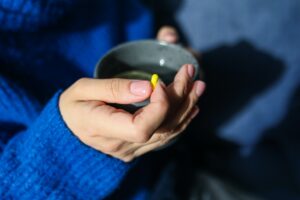Drug and Alcohol Rehab in Stourbridge
Drug and alcohol addiction is rife throughout the world, not just in countries where the economy is struggling, or healthcare and public services are poor.
The UK struggles to battle addiction and substance misuse, which is transparent in the West Midlands and Stourbridge.
It is estimated that substance use and addiction burdens the West Midlands , including Stourbridge, with economic costs of around £1.4 billion each year. [1]
These costs include dealing with drug-related crimes as well as tending to those dealing with health and social issues related to drug and alcohol addiction in Stourbridge and the West Midlands.
According to the same report, around 50% of burglary, theft, and robbery is committed by those who consume cocaine and heroin regularly in Stourbridge and the West Midlands. This represents 20% of reported crimes in the area. [1a]
Additionally, someone dies from drug poisoning every three days in the West Midlands.
Furthermore, studies estimate that there are around 602,000 dependent alcohol drinkers in England at any given time. [2]
Of this figure, less than 20% are receiving treatment. Northamptonshire was the area where drunken antisocial behaviour was perceived the most, followed by the West Midlands. [2a]
Clearly, there is a correlation between drug and alcohol consumption and antisocial behaviour or crime.
By helping people seek support from a drug and alcohol rehab in Stourbridge and reducing the stigma surrounding addiction, it will create a healthier community with a reduced crime rate.
Please call our 24-Hour Helpline:0800 140 4690.
What is Addiction?

Addiction is when a subject cannot abstain from consuming an addictive substance (substance use disorder) or taking part in an activity (e.g. sex, gambling). The terms addiction and substance use disorder are often used interchangeably.
Addiction is a disease that profoundly affects a person’s brain and behaviour. Neurologists officially recognise it as a chronic brain disease.
The brain disease model of addiction is more concerned with neurology than behavioural problems or lifestyle choices. [3]
For example, new neural pathways will be forged in the brain when a subject is exposed to a particular substance such as alcohol, heroin, or cocaine. [3a]
These reward pathways are altered, and in turn, the subject will become increasingly dependent on a particular substance. [3b]
Then, if the patient tries to abstain, they will experience a range of discomforting symptoms. Substances such as alcohol and heroin can present physical withdrawal symptoms such as nausea, headaches, trembling, seizures, and more.
Substances such as cocaine or cannabis present psychological withdrawal symptoms such as paranoia, anxiety, and depression.
The subject can then no longer feel optimal unless they consume this substance. Therefore, in order to quell withdrawal symptoms, they will reinitiate consumption.
Then, their tolerance will increase, and they will need to consume more in order to reach the same level of euphoria as before.
Please call our 24-Hour Helpline:0800 140 4690.
What Does a Drug and Alcohol Rehab in Stourbridge Involve?

The term rehab is an informal acronym for the word rehabilitation, which means to restore something back to its best condition.
In this case, rehab refers to a facility in Stourbridge, often a residential one, where patients can access addiction treatment by undergoing a range of therapy and counselling from licensed professionals.
In order to overcome a drug and alcohol addiction, subjects should seek the support of a drug and alcohol rehab in Stourbridge.
Here, they can receive high-quality treatment at a medically supported facility and understand how to maintain a lifestyle of abstinence and identify relapse triggers once they leave their rehab in Stourbridge.
When patients enter their drug and alcohol rehab in Stourbridge, they will need to undergo a medicated detox if they suffer from an alcohol or heroin addiction.
This is because these substances present physical withdrawal symptoms , which can be dangerous and potentially fatal. This will last around 7 to 10 days, depending on the patient , before proceeding to undergo therapy and counselling.
If a patient does not require a medicated detox, they can proceed to undergo therapy and counselling.
A range of therapy is implemented in order to help the patient tackle psychological and emotional issues related to their addiction.
This is because while addiction is the leading cause of entering rehab, psychological and emotional issues can exacerbate addiction or prevent patients from recovering successfully.
Patients at a drug and alcohol rehab in Stourbridge will also learn how to identify and prevent relapse triggers.
A well-structured relapse prevention planning strategy can assist the patient in maintaining sobriety once they have left their rehab facility in Stourbridge.
An aftercare programme will also be available for patients; this means that they will never be entire without support.
Aftercare programmes include a 12-Step Facilitation Programme and access to support networks and fellowship groups such as Alcoholics Anonymous, Narcotics Anonymous, and SMART Recovery.
Please call our 24-Hour Helpline:0800 140 4690.
How Can Someone Enter a Drug and Alcohol Rehab in Stourbridge?

In order to enter a drug and alcohol rehab in Stourbridge, subjects can contact Rehab Recovery by dialling the number 0800 088 66 86.
A trained admissions officer will then greet subjects and be there to answer any questions or help facilitate a necessary health assessment before entering rehab in Stourbridge.
The health assessment is swift and done in a relaxed manner.
Subjects will need to provide information on their addiction history, physical and mental health, any additional conditions they may have, personal requirements for their rehab, and so on.
A consultant psychiatrist will evaluate these details to find a suitable rehab in Stourbridge.
Providing these details is important because it will help identify a drug and alcohol rehab in Stourbridge, which is optimal for the patient.
It will help create an addiction treatment programme which is personalised and tailored to the patient’s unique needs.
Please call our 24-Hour Helpline:0800 140 4690.
What If I Want Someone Else to Enter a Rehab in Stourbridge?

If it is a loved one that you want to help recover by entering a drug and alcohol rehab in Stourbridge, Rehab Recovery can help you by assigning an interventionist.
It is not possible to enter someone into a drug and alcohol rehab without their consent; therefore, we must encourage them to enter rehab by conducting an intervention.
An interventionist will help you by facilitating intervention in Stourbridge. Here, a non-confrontational meeting consisting of open communication will ensue.
Family members and friends will have the platform to share their thoughts and feelings on how their loved one’s addiction is affecting them and why they want them to seek recovery.
Community Reinforcement and Family Training, or CRAFT, is a popular form of intervention due to its emphasis on supporting the addicted person’s family.
CRAFT implements methods such as communication skills training, motivation building, contingency management training, safety training, and more to help them cope with their loved one’s addiction.
Please call our 24-Hour Helpline:0800 140 4690.
Levels of Care at a Drug and Alcohol Rehab in Stourbridge

Clinicians must consider whether the patient should undergo addiction treatment as an outpatient or an inpatient.
Clinicians use a range of tools to determine which treatment is optimal for a patient, one of them being the ASAM Criteria, a multidimensional assessment tool and placement guideline.
According to the ASAM Criteria, patients can receive four levels of care. These are;
- Level 1: Outpatient Care
- Level 2: Intensive Outpatient Care
- Level 3: Inpatient Care
- Level 4: Intensive Inpatient Care
The patient will complete a health assessment, and the clinicians will refer to their six dimensions to determine which level of care they require in Stourbridge. The six dimensions of the multidimensional assessment include;
- Withdrawal Potential
- Health History and Physical Needs
- Emotional, Behavioural, Cognitive Conditions and Complications
- Readiness to Change
- Relapse Potential
- Recovering and Living Environment
Fortunately, patients will not have to self-diagnose to determine their level of care. Instead, Rehab Recovery will work with consultant psychiatrists to determine what level of care a patient requires in Stourbridge.
Please call our 24-Hour Helpline:0800 140 4690.
What is the Difference Between Outpatient and Inpatient Care?

Outpatient care is often associated with public and free services, whereas inpatient care is often associated with private residential treatment.
There are many differences between outpatient and inpatient addiction recovery treatments which will make one form more optimal for a patient than the other.
Care in the form of outpatient treatment appeals to patients because it offers affordability and flexibility.
Therapy and counselling sessions are often conducted in the evenings in order to cater to the traditional working schedule, meaning that patients can maintain employability while undergoing treatment.
Home detox is also an option as an outpatient. This is optimal for those suffering from a mild addiction and with social or occupational responsibilities in Stourbridge to tend to while recovering.
However, home detox and recovery aren’t optimal for patients who are suffering from a moderate to severe form of addiction. This is because their withdrawal symptoms are more severe and require medical supervision, and relapse potential can be high.
These are deemed high-risk patients. Other high-risk patients include those experiencing co-occurring disorders (e.g. depression, bipolar disorder), violent and erratic behaviour, pregnancy, and so on.
Anything condition that may interfere with recovery will require the patient to undergo treatment in Stourbridge as an inpatient.
Please call our 24-Hour Helpline:0800 140 4690.
Inpatient treatment at a drug and alcohol rehab in Stourbridge allows patients to undergo recovery while staying at an onsite accommodation.
This means they can shift their entire focus toward recovery without external distractions, which may act as relapse triggers.
Patients will also undergo a range of therapeutic activities and counselling sessions at a medically supported facility to assist their recovery.
Medical professionals will occupy their rehab facility in Stourbridge in order to provide care and support whenever needed.
How Much Does a Drug and Alcohol Rehab in Stourbridge Cost?

Inpatients usually spend around 28 days at their drug and alcohol rehab in Stourbridge as an inpatient. However, some patients may spend a long time if they are suffering from a very severe case of addiction.
For a 28-day stay at rehab in Stourbridge, the average cost is around £4,000 to £16,000 for inpatients.
Private residential rehabs can charge from £1,000 to £4,000 per week depending on the quality of their facilities, the quality of treatment, location, and so on.
While the cost of being an inpatient may be expensive, it is important to consider it as an investment into a better future, as addiction can ruin your physical and mental health, employability, and relationships with loved ones, and it can eventually lead to death.
The price for a 28-day stay at a drug and alcohol rehab in Stourbridge includes accommodation and utilities, insurance, therapy and medication, meals, and 24/7 care and support at your facility.
Patients can reduce the costs of their stay at a drug and alcohol rehab in Stourbridge by sharing a multi-occupancy room instead of a private one.
Additionally, if a patient has health insurance, they may have some of their treatment covered. Patients should have their insurance provider coordinate with their rehab provider to provide more information.
Please call our 24-Hour Helpline:0800 140 4690.
How Long Does Rehab Last?

The average length of stay at a drug and alcohol rehab in Stourbridge is around 28 days; however, it could be longer depending on the patient’s needs.
A patient needs to be able to sustain a lifestyle of abstinence with some independence before they return home, and a drug and alcohol rehab must spend time developing their knowledge and skills to do so.
Patients addicted to a physically addictive substance such as alcohol or heroin will be required to undergo a medicated detox for around 7 to 10 days. Here, they will receive medication and 24/7 care and support as the substance is withdrawing from their bodies.
This is done so that they can continue to undergo therapy and counselling without suffering from withdrawal symptoms. Once they overcome the discomforting physical symptoms associated with addiction, they can proceed with their recovery.
After completing a medicated detox or for those who do not need a medicated detox, they will spend the rest of their time at rehab undergoing a range of therapy and counselling sessions to tackle mental and emotional issues which could hinder recovery.
They will then undergo relapse prevention planning strategies.
Please call our 24-Hour Helpline:0800 140 4690.
Medicated Detox for Physically Addictive Substances

A medicated detox is when a patient enters a facility and allows toxic substances to withdraw from their body with the assistance of medication and medical professionals.
Here, they will receive 24/7 treatment to ensure that they can overcome their withdrawal symptoms safely and comfortably at rehab in Stourbridge.
There are typically three stages during a patient’s stay at a drug and alcohol rehab in Stourbridge.
These stages are; detoxification, rehabilitation, and aftercare. In order to undergo the stage of rehabilitation, patients will first need to detoxify.
The medicated detox is commonly associated with alcohol or heroin addiction, for example, because they are substances which present physical dependence and physical withdrawal symptoms.
Physical dependency can be more dangerous than psychological dependence because its symptoms can become potentially fatal.
The assistance of medication is also referred to as pharmacological intervention. Depending on the patient’s addiction and symptoms, medications will vary from benzodiazepines, naltrexone, Subutex, Librium, and more.
Different forms of medication will yield different benefits. For example, some will minimise withdrawal symptoms , whereas others will present an acute sensitivity to alcohol to prevent a relapse.
Ultimately, each has the same objective of assisting the patient in overcoming their withdrawal symptoms.
Please call our 24-Hour Helpline:0800 140 4690.
Does a Cocaine or Cannabis Addiction Require a Medicated Detox?

Substances such as cocaine or cannabis are psychologically addictive, not physically addictive.
Because of this, the withdrawal symptoms are different and do not require a medicated detox or pharmacological intervention in order to overcome withdrawal symptoms safely.
However, patients will still experience side effects from a psychologically addictive drug such as cocaine, and symptoms can persist from 7 to 10 days.
Patients may experience withdrawal symptoms such as irritability, headaches, or reduced cognitive function.
Please call our 24-Hour Helpline:0800 140 4690.
Therapy at a Drug and Alcohol Rehab in Stourbridge

Therapy will come in a variety of forms, each with a different purpose addressing a different issue.
There isn’t one form of therapy which is inherently better than another. Instead, they complement each other and combine to create the most optimal form of recovery for patients in Stourbridge.
Please call our 24-Hour Helpline:0800 140 4690.
Cognitive Behavioural Therapy

Cognitive Behavioural Therapy (CBT) is one of the most frequently utilised forms of therapy and will be implemented at a drug and alcohol rehab facility in Stourbridge.
This is because it is effective in helping patients tackle mental and behavioural issues.
Cognitive distortions and negative thoughts or behavioural patterns can present obstacles when a patient is trying to overcome addiction.
CBT helps patients understand their negative and self-destructive habits in order to replace them with more positive and healthier lifestyle habits.
Please call our 24-Hour Helpline:0800 140 4690.
Dialectical Behavioural Therapy

Similar to CBT, Dialectical Behavioural Therapy (DBT) aims to tackle negative behavioural and thought patterns presented by the patient. However, DBT places more emphasis on the emotional side of recovery.
Patients will become more equipped to manage these intense emotions by addressing them.
In turn, they will learn to accept and address their thoughts and feelings rather than be consumed by them, and they will be more capable of dealing with issues in all areas of life, not just addiction.
Please call our 24-Hour Helpline:0800 140 4690.
Motivational interviewing

Motivational Interviewing (MI) is a goal-oriented form of therapy that aims to elicit change from the patient by reinforcing their motivation levels and helping them achieve and sustain recovery.
There are three critical components to a patient’s motivation these are;
- The patient’s willingness to change
- Their confidence and ability to change
- Their readiness to change
In a typical MI session, a licensed counsellor will ask the patient many different evocative questions about their recovery.
The counsellor will also weigh the benefits and drawbacks of change with the patient and help them develop a clear goal-setting.
The patient will then hopefully feel much more engaged and motivated in their goals towards recovery.
Please call our 24-Hour Helpline:0800 140 4690.
Holistic and Alternative Therapies

Holistic Therapy can mean many different activities, from adventure therapy, massages, yoga, music therapy, aromatherapy, and much more.
It is an all-encompassing form of therapy that does not target individual symptoms but aims to increase patients’ overall well-being.
Holistic therapy activities can be relaxing (acupuncture, massages etc.) or engaging (equine therapy, adventure therapy etc.).
Relaxing activities can decrease patient stress levels, and engaging activities can increase motivation and decrease anxiety levels due to behavioural activation.
Please call our 24-Hour Helpline:0800 140 4690.
Group Counselling & Support Sessions

Therapy isn’t confined to one-to-one session. Group therapy sessions can be an effective tool in consolidating positive habits and a lifestyle of abstinence.
This is because the presence of peers and their discussions can produce social reinforcement and encourage a drug-free lifestyle.
Support sessions are often conducted in a way which many people would expect an Alcoholics Anonymous meeting to be.
Patients will sit in a circle and have the platform to share their thoughts and addiction-related experiences. In addition, it is effective in facilitating inspiration between patients who can resonate with one another.
Please call our 24-Hour Helpline:0800 140 4690.
Family Counselling & Therapy

While the addicted person is the one who will suffer from the direct effects of addiction, there are many indirect effects which have profound ramifications on families, friends, and the community.
This is why Rehab Recovery specialises in family counselling and therapy.
The effects of addiction can cause friends and family to feel resentful, worried, or angry towards their loved ones, and this can lead to relationship breakdown and social isolation.
This can then lead to a more severe form of addiction because of the lack of a support network.
Family counselling creates a safe environment for the friends and family of the addicted person to openly communicate their thoughts and feelings.
The family will also gain insight into the complexities of addiction. Once they understand more about addiction, they can better cope with their loved one’s addiction and support them when they can.
Please call our 24-Hour Helpline:0800 140 4690.
Dual Diagnosis and Co-Occurring Disorder Treatment at Rehab

It is important to realise that people suffering from a drug or alcohol addiction often suffer from another disorder. These can be physical or mental illnesses, and they can be a direct cause of addiction, or they could have manifested before addiction.
Addiction can present long-term health ramifications such as liver cirrhosis, kidney disease, Wernicke-Korsakoff Syndrome, and much more.
However, health conditions can be a driving factor in what exposes people to addiction, rather than addiction exposing people to illnesses.
Many people suffering from addiction also suffer from mental disorders such as anxiety, depression, paranoia, bipolar disorder, and so on.
When patients enter rehab with co-occurring disorders, a dual diagnosis will be made, and they will receive treatment for their other illnesses.
In fact, some forms of therapy are already implemented into an addiction treatment programme.
These forms include; Cognitive Behavioural Therapy, Dialectical Behavioural Therapy, and Holistic Therapy, which are often utilised to treat patients suffering from trauma, depression, and much more.
Please call our 24-Hour Helpline:0800 140 4690.
Relapse Prevention Planning & Aftercare

Relapse prevention planning is essential to any optimal drug and alcohol addiction treatment programme. While the patient needs to overcome their addiction, they also need to be able to sustain this recovery.
At a drug and alcohol rehab in Stourbridge, the patient will undergo a range of relapse prevention planning strategies in order to ensure that they have the knowledge and tools to maintain their lifestyle of abstinence.
Therapies such as CBT help patients understand and identify potential relapse triggers, and holistic therapies can promote mindfulness and recognise any relapse triggers before they actually happen.
Furthermore, HALT stands for Hungry, Alone, and Tired.
Two people talking is a popular form of relapse prevention planning tool which seeks to help patients manage their physical and emotional needs, intense emotions, feelings of isolation, and mental or physical fatigue.
Please call our 24-Hour Helpline:0800 140 4690.
The 12-Step Facilitation Programme:

The 12-Step Facilitation Programme is an active engagement strategy to have patients practice a lifestyle of abstinence in order to maintain their recovery.
Popular fellowship programmes such as Alcoholics Anonymous and Narcotics Anonymous utilise this method to help their patients sustain sobriety.
The programme has three key principles which predominate to optimise the effectiveness of its patients, and these are acceptance, surrender, and active involvement.
Acceptance includes the realisation that addiction is a chronic brain disease where abstinence is the only way to overcome it. Surrender means giving oneself to a higher power and accepting the support structure presented by the programme.
Active involvement requires that patients consistently attend meetings and participate in activities to sustain and promote a healthy lifestyle.
Please call our 24-Hour Helpline:0800 140 4690.
References
[1] Drugs – West Midlands Police https://www.westmidlands-pcc.gov.uk/drugs-2/
[2] Alcohol Statistics https://alcoholchange.org.uk/alcohol-facts/fact-sheets/alcohol-statistics
[3] [3a] [3b] Re-Socialising the Vulnerable Brain https://www.frontiersin.org/articles/10.3389/fsoc.2018.00039/full#:~:text=The%20brain%20disease%20model%20of%20addiction%20(BDMA)%20states%20that%20addiction,is%20portrayed%20in%20the%20model
[4] Alcoholics Anonymous https://www.aa.org/
[5] Narcotics Anonymous https://www.na.org/
[6] SMART Recovery https://www.smartrecovery.org/
[7] Community Reinforcement and Family Training https://www.apa.org/pi/about/publications/caregivers/practice-settings/intervention/community-reinforcement
[8] About the ASAM Criteria https://www.asam.org/asam-criteria/about-the-asam-criteria
apa.org/…rvention/community-reinforcement[9] Cognitive Behavioural Therapy in Addiction Treatment https://www.rehab-recovery.co.uk/addiction-treatments/cognitive-behavioural-therapy/
[10] Motivational Interviewing Techniques https://www.racgp.org.au/afp/2012/september/motivational-interviewing-techniques
[11] Behavioural Activation for Depression https://medicine.umich.edu/sites/default/files/content/downloads/Behavioral-Activation-for-Depression.pdf
[12] Principles of Drug Addiction Treatment: A Research-Based Guide https://books.google.co.th/books?id=mtMdJ3qqSnQC&printsec=frontcover&dq=addiction+treatment&hl=en&sa=X&ved=2ahUKEwiDlMP3zob3AhXiwjgGHYJtDZ8Q6AF6BAgDEAI#v=onepage&q=outpatient&f=false
[13] Family Addiction Counselling https://www.rehab-recovery.co.uk/addiction-treatments/family-therapy/
[14] Wet Brain from Alcohol
[15] A Strategy to Prevent Relapse: HALT https://www.newenglandrecoverycenter.org/blog/a-strategy-to-prevent-relapse-remember-to-halt/
[16] 12-Step Facilitation Therapy


